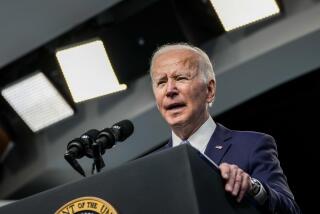Reagan ‘Optimistic’ About Prospects for Summit
- Share via
WASHINGTON — Expressing his greatest enthusiasm so far about the next U.S.-Soviet summit, President Reagan says new proposals by Soviet leader Mikhail S. Gorbachev have “opened additional doors that make me optimistic” about prospects for “a summit where we can reach agreement” on some issues.
Reagan said that Gorbachev’s letter of June 23 contained proposals not only on arms control but also on regional conflicts around the world, such as in Afghanistan, and on “human rights and emigration.”
The correspondence was “quite a packet--and worthwhile,” Reagan added. “We’re studying that (the packet) and our own reply. . . . I hope that this will all become part of the agenda of a summit meeting.”
No date for the next summit has been set yet, Reagan said, but it is expected to take place in November, December or possibly January. Secretary of State George P. Shultz and Soviet Foreign Minister Eduard A. Shevardnadze will meet at the United Nations in September, if not sooner, to discuss a schedule.
U.S. officials, calling Gorbachev’s letter “generally positive,” had left the impression that it dealt primarily with arms issues. But the President, in an interview with USA Today published Thursday, gave the first indication that it was broader in scope, though he did not provide details.
Gorbachev “has made additional proposals with regard to not only the subject of arms control,” he said, “but the other things we discussed at Geneva which had to do with the regional conflicts going on in the world, had to do with human rights and emigration and so forth. . . .
“We’re putting together our own reply because, again, I think it opened additional doors that make me optimistic that we’re not only going to have a summit but that we’re going to have a summit where we can reach agreement on some of the . . . goals that we share,” Reagan added.
Formulating Arms Response
In addition to formulating a reply to Gorbachev, the Administration is preparing a response to the latest Soviet arms proposals made at the Geneva arms control talks before they recessed last week. That response could be contained in Reagan’s official response to the letter, which is expected before the negotiations formally resume in mid-September.
The Soviet arms proposal called for reductions in offensive long-range nuclear weapons: 50% in missiles and bombers and about 20% in warheads and bombs they carry. However, such cuts would be made only if the United States agrees to restrict work on its Strategic Defense Initiative program, the so-called “Star Wars” space-based missile defense system, to laboratory research and forgoes deployment of such a system for 15 to 20 years.
Reagan has said that the Soviet proposal merits serious study but that it could not be accepted without some changes.
‘Regional’ Issues
Among “regional” issues--a euphemism for conflicts in the Third World in which the two superpowers have stakes--are the Middle East, Nicaragua, Angola, Ethiopia, Cambodia and Afghanistan. U.S. and Soviet officials meet periodically to discuss their positions on the conflicts, as Gorbachev and Reagan did during their November summit.
During such discussions, neither party directly proposes conditions for settlements, officials said. Instead, each side outlines its own views in an effort to ensure that no larger power conflicts arise from misunderstandings.
On human rights issues, the United States has long sought to improve Soviet treatment of individual cases, those involving dissidents such as Nobel Peace Prize winner Andrei D. Sakharov and Jews wishing to emigrate.
Since the previous summit, the Soviets have announced that more than 70 families who had both U.S. and Soviet citizenship would be allowed to leave. Moscow also released Anatoly Shcharansky, a Jewish and human rights activist, after almost nine years in prison.
But overall, Jewish emigration remains at almost its lowest point in 20 years, with only 55 exit visas granted last month, contrasted with more than 4,200 a month at its peak in 1979.
More to Read
Get the L.A. Times Politics newsletter
Deeply reported insights into legislation, politics and policy from Sacramento, Washington and beyond. In your inbox twice per week.
You may occasionally receive promotional content from the Los Angeles Times.










